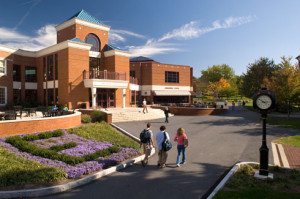CUSTOMER PROFILE
Green innovation turns Elizabethtown College food waste into electricity
 Elizabethtown College, located near Harrisburg, PA is a private, residential co-ed college of 1900 students living on 200 acres.
Elizabethtown College, located near Harrisburg, PA is a private, residential co-ed college of 1900 students living on 200 acres.
Case Study
Elizabeth College
 Elizabethtown College, located near Harrisburg, PA is a private, residential co-ed college of 1900 students living on 200 acres.
Elizabethtown College, located near Harrisburg, PA is a private, residential co-ed college of 1900 students living on 200 acres.
Director of Facilities Management and Construction Joe Metro and local farmer Mike Brubaker wanted to partner on a project that would use the College’s organic waste to create electricity. According to Metro, this effort is part of the College’s long-term commitment to protecting the environment. “For many years Elizabethtown College has taken a proactive approach to the efficient use of water, natural gas, fuel oil and electricity and in the reduction of the sanitary waste and solid waste we generate,” he says.
Director of Dining Services Eric Turzai was already field-testing a Somat waste pulping system that would reduce the volume of organic material and allow for reduced water consumption in the College’s Marketplace eatery.
In the process, food waste is carefully sorted by Elizabethtown’s Dining Services team, ground up and then piped to the Somat Company extractor, which “dewaters” the organic material. The solids and the wastewater are transported twice a week to the Brubaker farm.
At the farm, the organic material and wastewater are mixed with cow manure and fed into a digester. In the digester, the organic material catalyzes the production of methane gas from the cow manure. The methane is then harvested and used to power an engine/generator, which creates electricity. The residual wastes, which have been sterilized by the microbial process in the digester, are used for bedding and fertilizer at the farm.
While colleges and universities nationwide have composted organic materials to reduce waste and limit their environmental impact, few are using the resulting material to create electricity. None have combined these projects with a system that reuses water. By marrying these sustainability efforts, Elizabethtown College and its partners have created a workable system that is producing enough power for about 200 homes and significantly cutting water consumption and waste at Elizabethtown—proving that even a small college can take a big step toward protecting the environment.
The unique water recycling aspect of the Elizabethtown College system reuses 4,400 gallons per week. Additionally, no byproducts of the pulping process, neither liquid nor solids, enter the sanitary sewer system on campus. The recycled water is collected at daily shutdown time and transported twice a week to Brubaker Farms for use as gray water. Since implementing the system, Elizabethtown College has lowered water consumption by approximately 80 percent and cut waste hauling charges in half for the College’s Marketplace Dining Facility. It has been called a “best practice” in sustainability.
The project has been a win-win for all the project partners and, most importantly, for the Earth. Mike Brubaker is creating electricity that he can sell back to the electric company. And, Somat Company is gaining invaluable operational experience with a piece of equipment that may be in greater demand as more environmentally-conscious institutions, like Elizabethtown College, seek opportunities to keep our planet green